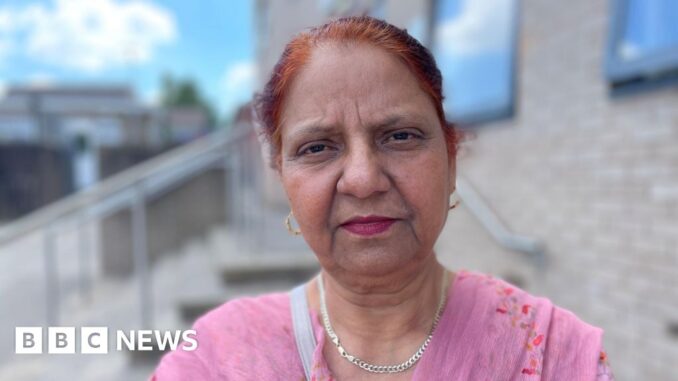
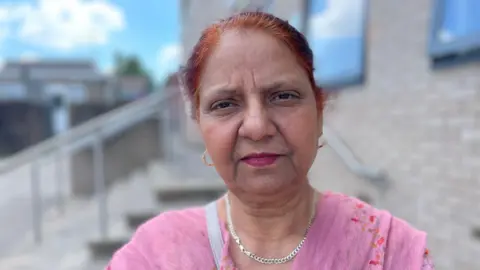 BBC
BBCOpen your wardrobe, and there’s a good chance you’ll find garments made in Leicester.
The city was the engine of England’s clothing industry, with companies including retail giant Next keeping tens of thousands of people in work.
After many years of factory closures, a boom in fast fashion then created a profitable new industry.
Sub-contractors offered the flexibility to deliver large orders to tight deadlines, as stores focused on piling it high and selling it cheap.
But then the coronavirus pandemic lifted the lid on how intense competition had created widespread exploitation in Leicester’s supply chain.
Now the city is fighting to save its garment manufacturing industry once again.
Paramjit Kaur, 61, worked as a sewing machine operator at several Leicester companies after moving from India to join her husband Harvinder Singh.
By the time she arrived in 2015, there was already growing concern about garment factories paying well below the living wage.
Paramjit says she could not speak English and struggled to find work, so she spent years working in factories that paid her between £3 and £5 an hour.
She says some employers covered their tracks by creating a paper trail, which appeared to show she earned the National Living Wage.
‘We were desperate’
Speaking in a mixture of Hindi and Punjabi, Paramjit described how one company asked her to work for a £5 hourly rate, adding others did not give her holiday or sick pay.
“They would show ‘full pay’ on the payslip but once the money was in my bank, I was told to return it,” she said.
“I used to give it back in cash. Three or four factories used to do this.”
When asked why she returned the money, Paramjit said: “It felt dirty and bad but I needed to work. No-one was paying more.
“We were desperate. We had to pay council tax, the gas bill, rent. The bills kept coming.
“It felt horrible. ‘Keep working, keep working’, is what they would say.”
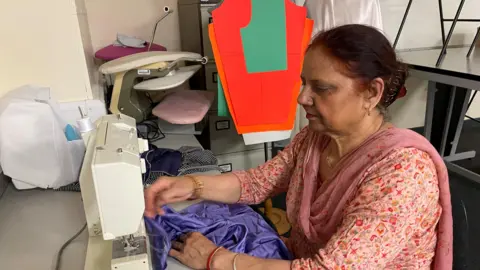
Paramjit is one of several workers from India who told the BBC they earned £5 an hour or less in different clothing factories in Leicester.
That is well below the National Living Wage, which now stands at £11.44 an hour for adults over 21.
A woman in her 50s, who asked not to be identified for fear of repercussions, told the BBC she was paid £4 an hour to work as a “packer” in various garment factories.
“I thought it was reasonable and it was the going rate,” she said.
“It was what most people were getting. I was desperate to work and save because I have to support my parents, my sister and nieces back in India.”
The workers have been supported by the Fashion-workers Advice Bureau Leicester (FAB-L), which is funded by retail brands.
These brands insist that factories making their clothes allow FAB-L to go into their sites and support workers.

Tarek Islam, from FAB-L, says the group helps exploited garment workers who often struggle because of poor English language skills.
Tarek says Leicester’s garment workers sometimes accept such low wages because they are afraid of losing Universal Credit if they do not take action to get paid work.
Employers also convince workers they are doing them “a favour” by giving them the experience to find minimum wage jobs, Tarek adds.
Tarek says some firms demand unpaid hours, or cash refunds, so their audits record the payment of “full wages”.
“They [employers] may make a payslip for 18 hours, so on the system people are getting paid for 18 hours, but they’ll make them work for 36 hours,” Tarek says.
“So when you check the paperwork, everything seems fine. Another thing they’ll do is say, ‘I’ll pay the full wages in your account, so on paper we can pass all the audits, however we agreed only £5 to £6 an hour, so that extra money you need to give back to me’.”
Tarek says exploitation in the industry has been the “absolute norm”.
However, he adds: “Because the brands have increased their auditing process, and become tighter, the workers we’ve spoken to mostly say they’re being paid the minimum wage.”
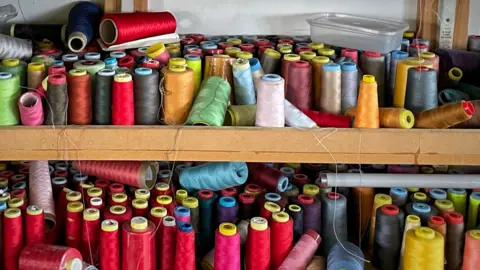
Tarek says FAB-L has helped 90 garment workers recover a total of £180,000 of unpaid wages since its launch in early 2022.
But he believes that is the tip of the iceberg.
Tarek says one woman burst into tears as she explained how she was owed £5,000 – and too afraid to tell her husband in case he accused her of spending it.
Tarek discovered that her factory had not paid 60 workers for three months.
It then emerged that factory was also waiting for late payments, and FAB-L helped everyone recover their money.
Tarek says he has previously persuaded garment businesses to pay up by offering to “mediate” complaints with the fashion brands they supply.
“As soon as I say, ‘do you want me to raise it with the brand?’ They’ll say ‘maybe we can resolve it between ourselves’,” he said.
FAB-L has been funded by eight brands – including Asos, River Island and Next – and two trade unions.
The group was set up in response to damning headlines about exploitation in Leicester’s clothing supply chain during the pandemic.
 Boohoo
BoohooThe tipping point came after barrister Alison Levitt published a scathing report about factories supplying the online fashion retailer, Boohoo.
Tarek says UK fashion brands are now “trying to be reputable”, and now most garment workers still employed in Leicester say they are receiving the National Living Wage.
But many workers have lost their jobs as some suppliers shifted contracts overseas.
Several estimates seen by the BBC suggest the vast majority of Leicester’s garment factories have closed since the crackdown began.
The Apparel and Textile Manufacturers Federation believes about 700 were operating five years ago, compared to only 60 to 100 now.
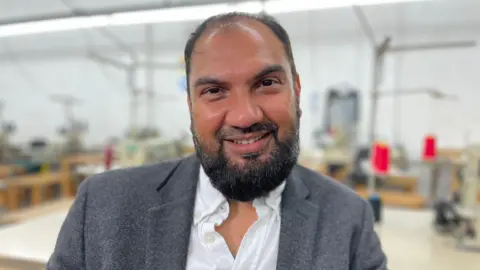
Saeed Khilji, from the Textile Manufacturer Association of Leicestershire, believes the scandal in the city did “huge damage” to legitimate clothing businesses that were already struggling to make a profit.
He says that persuaded many retailers to avoid production in Leicester.
The pandemic also drove a rise in online shopping.
Another manufacturer, Alkesh Kapadia, believes that was an even more serious blow to Leicester’s business model.
He says the previous model relied on retailers ordering large quantities of each design to fill their stores across the country, whereas online brands need much smaller quantities of each design.
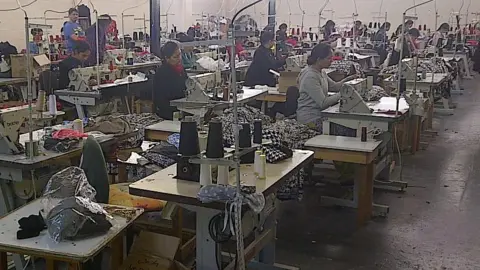 Alkesh Kapadia
Alkesh KapadiaAlkesh used to export clothes from his Leicester factories as far afield as the US, Canada and India.
But he says he has lost £2.5m the past 12 to 18 months because retailers have demanded ever-lower prices at a time when costs have risen.
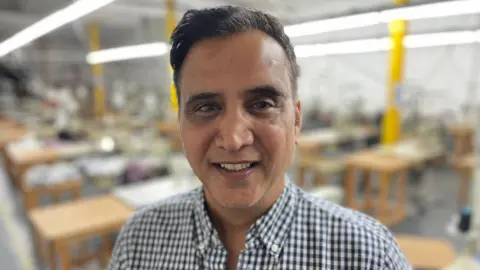
Now his company has moved production to factories in Morocco, Turkey and Tunisia, where manufacturing is cheaper.
“Fashion was my passion,” he says. “My surname is Kapadia. Kapadia means fabric.
“For 200 years we used to make fabrics. My father up there would be really upset that I have stopped this business.”
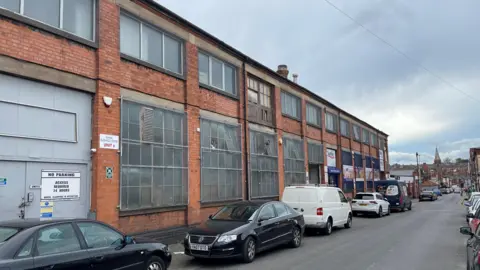
Meanwhile, Saaed used six Leicester factories to make his garments, but now he says he only runs an import-export business because the UK is impossible to afford.
“As a factory owner, we not only pay the minimum wage,” he says. “There’s also national insurance, rent, the electricity bill. Nothing has gone down.”
The catalyst for change was two-fold, he says.
“Mainly the price issue. Living costs were rising, but retailers didn’t want to pay the price, and secondly, we had sweatshops in Leicester, [but] 95% of factories were good but struggling, because we got this bad name because of this 5%,” Saeed adds.
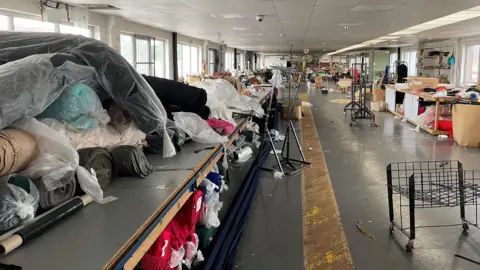
Saeed’s factory, in Nottingham Road, never reopened after orders were cancelled during Covid.
“All orders we had stopped,” he says. “All fabrics we had, we can’t use it. Retailers cancelled orders because they can’t sell. When they cancelled, they didn’t pay us.”
He says that has left him with stock that he cannot sell and will donate to charity.
Saeed says he “cannot see any future” for garment production in Leicester, and Alkesh agrees.
“We are thinking that Leicester will die if you don’t do anything now. Even if you do something now, it’s very hard to save this industry,” Alkesh says.
Alkesh and Saeed are still based in Leicester, but both have set up their own online retail brands to sell imported clothes to customers directly.
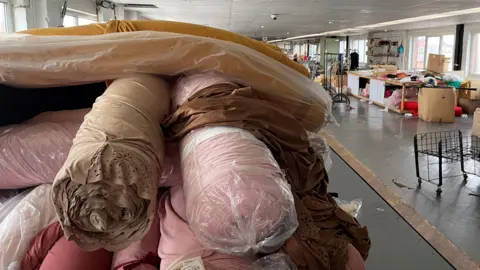
However, the non-profit organisation Labour Behind the Label is now campaigning for fashion brands to support the city’s ailing manufacturing industry.
It wants brands to commit to ordering at least 1% of their products from Leicester’s factories.
Tarek, from FAB-L, says brands also need to consider more serious exploitation overseas.
“Imagine what exploitation is happening there,” he says. “Child labour. Trade unions being killed in factories.
“A brand producing in the UK, even with exploitation in their chain, is better than a brand that is producing out of the UK.”
Prof Rachel Granger, from the city’s De Montfort University, is an industry expert.
She believes Leicester’s garment industry will only survive if there is significant investment in new robot technology and a focus on quality.
“Germany had the same problem a decade earlier and invested in robots,” she says.
“There just are not the resources to invest, that is the crux of the problem.”



Be the first to comment